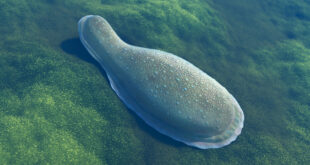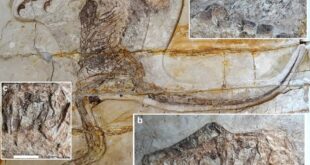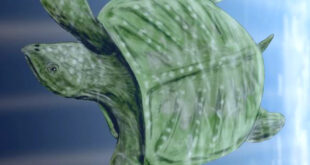The rapid rise of marine planktonic algae 659-645?million years ago (Cryogenian period), between the Sturtian and Marinoan ‘snowball Earth’ glaciations, created food webs with more efficient nutrient and energy transfers, driving ecosystems towards larger and increasingly complex organisms, according to new research.
Cryogenian Earth. Image credit: NASA.
The study, published this week in the journal Nature, involved an international team of researchers from the Australian National University, the Max Planck Institute for Biogeochemistry and the University of Bremen.
The team discovered ancient sedimentary rocks in central Australia that related directly to the period just after the melting of the snowball Earth.
“In these rocks we discovered striking signals of molecular fossils. We immediately knew that we had made a ground-breaking discovery that snowball Earth was directly involved in the evolution of large and complex life,” said co-author Dr. Amber Jarrett, of the Australian National University.
“We crushed these rocks to powder and extracted molecules of ancient organisms from them,” added lead author Dr. Jochen Brocks, also from the Australian National University.
“These molecules tell us that it really became interesting 650 million years ago. It was a revolution of ecosystems, it was the ‘Rise of Algae’.”
“The rise of algae triggered one of the most profound ecological revolutions in Earth’s history, without which humans and other animals would not exist.”
“Before all of this happened, there was a dramatic event 50 million years earlier called snowball Earth,” he said.
“The Earth was frozen over for 50 million years. Huge glaciers ground entire mountain ranges to powder that released nutrients, and when the snow melted during an extreme global heating event rivers washed torrents of nutrients into the ocean.”
“The extremely high levels of nutrients in the ocean, and cooling of global temperatures to more hospitable levels, created the perfect conditions for the rapid spread of algae,” Dr. Brocks said.
“It was the transition from oceans being dominated by bacteria to a world inhabited by more complex life.”
“These large and nutritious organisms at the base of the food web provided the burst of energy required for the evolution of complex ecosystems, where increasingly large and complex animals, including humans, could thrive on Earth.”
_____
Jochen J. Brocks et al. The rise of algae in Cryogenian oceans and the emergence of animals. Nature, published online August 16, 2017; doi: 10.1038/nature23457
 #Bizwhiznetwork.com Innovation ΛI |Technology News
#Bizwhiznetwork.com Innovation ΛI |Technology News




